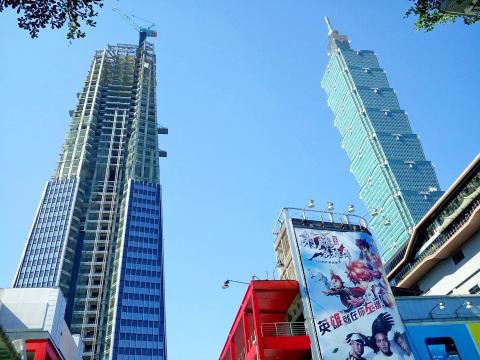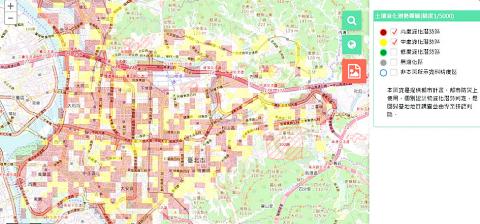The Taipei City Government yesterday unveiled a map showing areas in the city prone to soil liquefaction, with 26.1 percent of the city having intermediate to high-level soil liquefaction potential.
Soil liquefaction is a geological phenomenon that occurs when shaking during an earthquake causes saturated granular material to behave like a liquid, potentially causing soil to be unable to support structures above it.
Soil liquefaction has become a prominent issue, as it is believed to have contributed to the collapse of the Weiguan Jinlong complex in Tainan that killed 115 people when a magnitude 6.4 earthquake hit the city on Feb. 6.

Photo: Hsu Yi-ping, Taipei Times
The city government map showed that 17.4 percent of Taipei is highly prone to soil liquefaction, while 8.7 percent and 1.5 percent of the city face intermediate and low risks of liquefaction respectively.
The Taipei Department of Public Works said 54.4 percent of the municipality is in mountainous areas, which are not at risk of liquefaction, while another 3.5 percent of land has not displayed any potential for liquefaction.
Liquefaction potential of 14.5 percent of the city could not be determined due to insufficient data.

Photo: Huang Chien-hao, Taipei Times
Notable landmarks that were identified by the map as in areas showing a high probability of soil liquefaction include Taipei 101 and the Taipei City Hall.
Taipei Mayor Ko Wen-je’s (柯文哲) home on Xinyi Road was also found to be in an area showing a high risk of soil liquefaction.
In response to reporters’ questions about whether he was concerned about his home being vulnerable to earthquakes, Ko said he was not, as it was built after the 921 Earthquake in 1999.
He said that construction regulations introduced after the 921 Earthquake mandate sufficient seismic engineering work be carried out on new buildings.
He called on residents whose homes are deemed vulnerable to earthquakes to file a request with the city government to be part of the city’s urban renewal projects.
The department urged people not to panic if their homes are found to be in areas susceptible to liquefaction, as they might be eligible for an “old building health check” performed by the city’s Construction Management Office and receive subsidies if urban renewal efforts are deemed necessary for their homes.
Compared with the Executive Yuan’s query system for soil liquefaction potential, the map features a larger scale and is five times more accurate, the department said.
Residents can find out about the risk of soil liquefaction in their neighborhoods by entering their addresses on the city’s soil liquefaction query system: http://soil2.taipei/gismap.html.

Conflict with Taiwan could leave China with “massive economic disruption, catastrophic military losses, significant social unrest, and devastating sanctions,” a US think tank said in a report released on Monday. The German Marshall Fund released a report titled If China Attacks Taiwan: The Consequences for China of “Minor Conflict” and “Major War” Scenarios. The report details the “massive” economic, military, social and international costs to China in the event of a minor conflict or major war with Taiwan, estimating that the Chinese People’s Liberation Army (PLA) could sustain losses of more than half of its active-duty ground forces, including 100,000 troops. Understanding Chinese

The Ministry of Foreign Affairs (MOFA) yesterday said it is closely monitoring developments in Venezuela, and would continue to cooperate with democratic allies and work together for regional and global security, stability, and prosperity. The remarks came after the US on Saturday launched a series of airstrikes in Venezuela and kidnapped Venezuelan President Nicolas Maduro, who was later flown to New York along with his wife. The pair face US charges related to drug trafficking and alleged cooperation with gangs designated as terrorist organizations. Maduro has denied the allegations. The ministry said that it is closely monitoring the political and economic situation

‘SLICING METHOD’: In the event of a blockade, the China Coast Guard would intercept Taiwanese ships while its navy would seek to deter foreign intervention China’s military drills around Taiwan this week signaled potential strategies to cut the nation off from energy supplies and foreign military assistance, a US think tank report said. The Chinese People’s Liberation Army (PLA) conducted what it called “Justice Mission 2025” exercises from Monday to Tuesday in five maritime zones and airspace around Taiwan, calling them a warning to “Taiwanese independence” forces. In a report released on Wednesday, the Institute for the Study of War said the exercises effectively simulated blocking shipping routes to major port cities, including Kaohsiung, Keelung and Hualien. Taiwan would be highly vulnerable under such a blockade, because it

UNRELENTING: China attempted cyberattacks on Taiwan’s critical infrastructure 2.63 million times per day last year, up from 1.23 million in 2023, the NSB said China’s cyberarmy has long engaged in cyberattacks against Taiwan’s critical infrastructure, employing diverse and evolving tactics, the National Security Bureau (NSB) said yesterday, adding that cyberattacks on critical energy infrastructure last year increased 10-fold compared with the previous year. The NSB yesterday released a report titled Analysis on China’s Cyber Threats to Taiwan’s Critical Infrastructure in 2025, outlining the number of cyberattacks, major tactics and hacker groups. Taiwan’s national intelligence community identified a large number of cybersecurity incidents last year, the bureau said in a statement. China’s cyberarmy last year launched an average of 2.63 million intrusion attempts per day targeting Taiwan’s critical